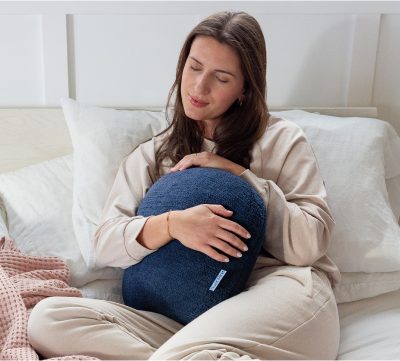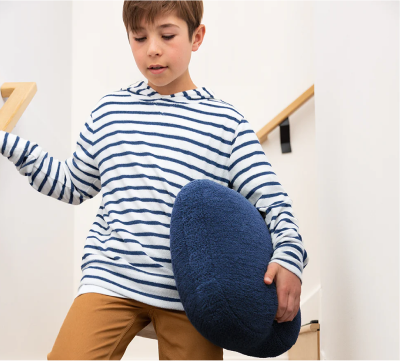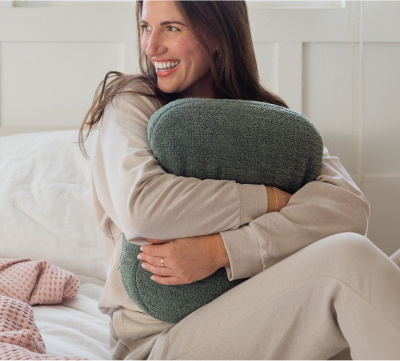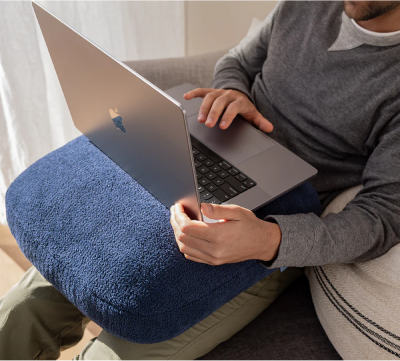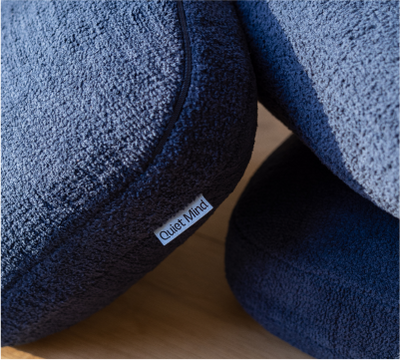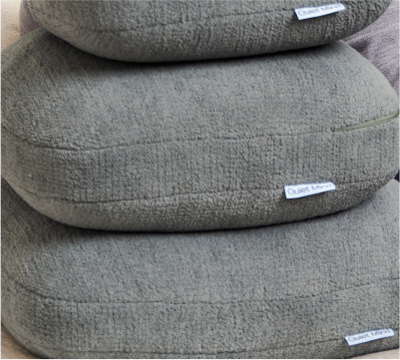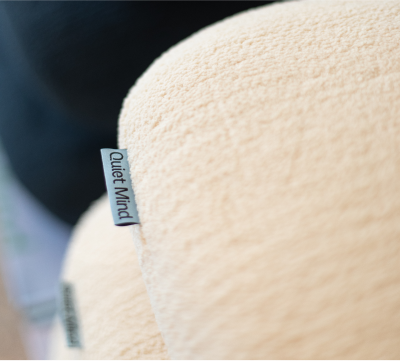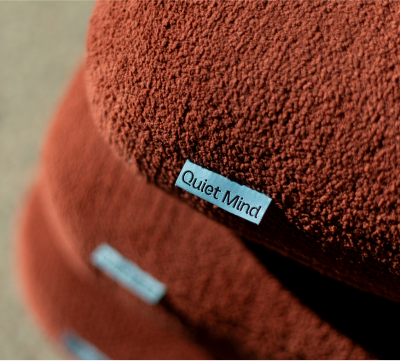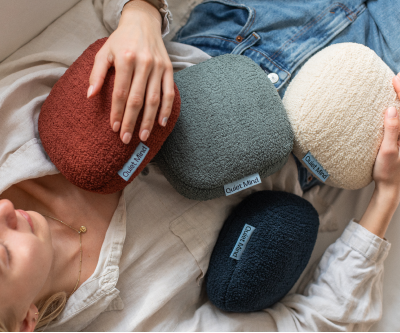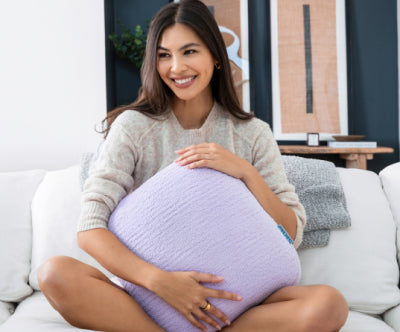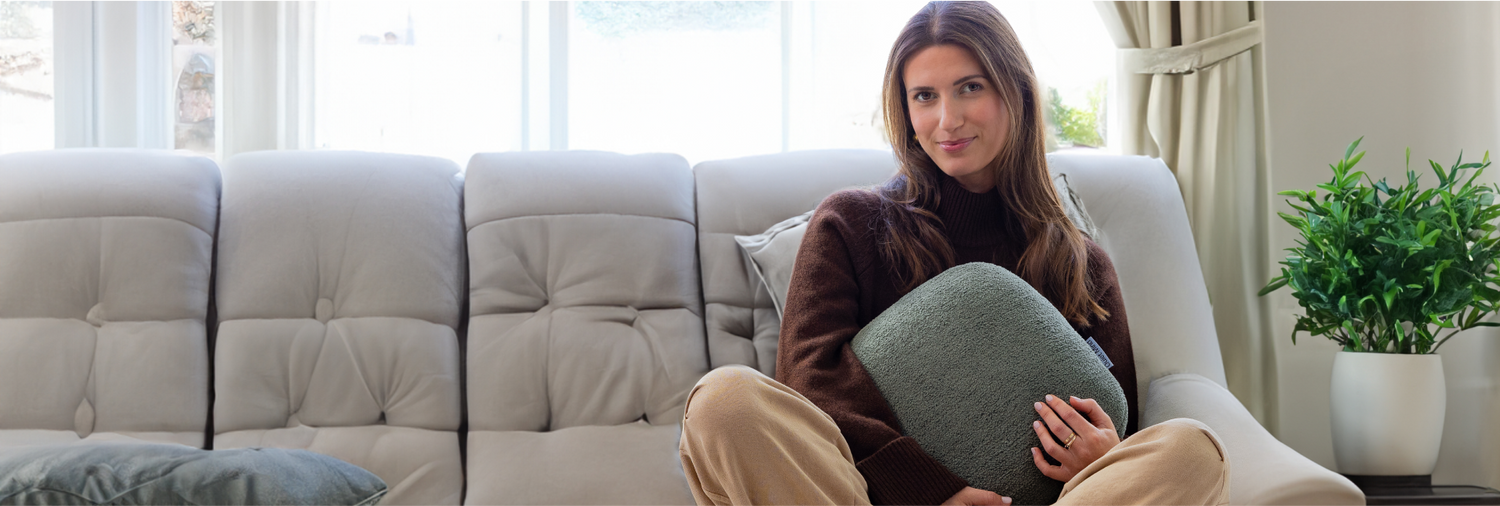There’s something deeply grounding about gentle pressure, a steady reassurance that helps your body let go. For many people, especially those navigating sensory sensitivity or high stress levels, a weighted pillow can help restore that sense of calm.
If you’ve ever wondered whether weighted pillows are good for you, the answer depends on how your body responds to deep, consistent pressure. A weighted pillow is more than just a comforting object; it's a sensory support tool designed to provide deep pressure therapy (DPT), similar to the effects of a weighted blanket.
This type of calming input may promote relaxation, reduce anxiety, and help ease the stress hormone cortisol. When chosen and used mindfully, a weighted pillow can support restful sleep, emotional regulation, and focus; especially for individuals managing ADHD symptoms, sleep difficulties, or chronic restlessness.
What Is a Weighted Pillow and How Does It Work?
A weighted pillow is a compact sensory tool designed to provide gentle, grounding pressure. Similar to a weighted blanket, it applies deep pressure to the body, but in a more targeted, portable form. Many people use it to reduce anxiety, improve focus, and support sleep, especially when full-size blankets feel too overwhelming.
How It Works: Deep Pressure Stimulation in Pillow Form
Weighted pillows use deep pressure stimulation (DPS), a form of consistent, evenly distributed pressure that activates the body’s parasympathetic nervous system. This helps shift the body into a calmer state by:
- Slowing the heart rate and deepening the breath.
- Lowering levels of cortisol (the stress hormone).
- Increasing feel-good neurotransmitters like serotonin and dopamine.
The result is a sense of safety and stillness, which may support focus, rest, or emotional regulation, depending on how and when the pillow is used.
How It’s Different from Regular and Body Pillows
While standard pillows are designed for softness or support, weighted pillows add a sensory layer of calm. Here’s how they compare:
|
Feature |
Weighted Pillow |
Regular Pillow |
Body Pillow |
|
Primary Purpose |
Sensory grounding and emotional support |
Sleep support (head/neck alignment) |
Full-body comfort and alignment |
|
Weight |
Heavier (3–7 lbs) |
Light and airy |
Light to moderate |
|
Fill Materials |
Glass beads, plastic pellets, natural fill |
Foam, fiberfill, down |
Foam, memory foam, fiberfill |
|
Target Area |
Lap, chest, neck, shoulders |
Head and neck |
Torso, legs, and back |
|
Portability |
Easy to carry or use in different settings |
Typically stays on the bed |
Less portable due to larger size |
Why This Matters for Sensory and Emotional Health
For many people with ADHD, anxiety, or sensory overload, regulating emotional states throughout the day is a challenge. A weighted pillow can offer a non-invasive way to help your body return to baseline without needing to talk, move, or explain. It’s a quiet support, literally held in your hands.
What Are the Benefits of Using a Weighted Pillow for Mind and Body?
Weighted pillows offer both physical and emotional benefits when used regularly and intentionally. Here are some of the most common ways they support the nervous system and daily functioning.
Helps Reduce Stress and Anxiety
One of the primary benefits of weighted pillows is their role in emotional regulation. The gentle pressure they provide mimics the comforting sensation of being held. This can reduce activity in the sympathetic nervous system and increase a sense of safety.
Here are some of the key emotional benefits people may experience when using a weighted pillow:
- Reduces Stress: Helps calm the nervous system by lowering cortisol levels.
- Alleviates Anxiety: Creates a sense of security through consistent, soothing weight.
- Improves Mood: Encourages the natural release of serotonin and dopamine, promoting emotional balance.
If you’ve ever wondered if weighted pillows are good or not, their growing use in therapeutic settings and the calm they bring to everyday routines make a compelling case. Holding your weighted pillow during meditation or at night can create a soothing ritual that helps you feel anchored and less reactive.
Supports ADHD, Autism, and Sensory Regulation
For individuals with ADHD, autism, or sensory processing difficulties, weighted pillows can help regulate overwhelming input. The steady input provides grounding without requiring active participation.
- Helps with focus and relaxation during desk work or reading.
- Reduces restlessness and overstimulation.
- Offers a predictable and comforting routine.
A great option here would be the Quiet Mind weighted pillow, which helps individuals that struggle with transitions or need support staying present.
Encourages Sleep and Relaxation
Just like weighted blankets, a weighted pillow can help you sleep better by reducing sleep latency (the time it takes to fall asleep) and encouraging deeper rest. Here are some of the key sleep-related benefits:
- Promotes relaxation: Signals the body to slow down and deepen the breath, creating a sense of calm.
- Helps you sleep better: Reduces night-time awakenings and supports a more continuous sleep cycle.
- Calms the mind: Assists in shifting from a state of wakefulness into rest, helping the nervous system settle.
For those navigating insomnia or nighttime anxiety, using a weighted pillow at night can support a more consistent sleep setup, especially when placed across the chest or neck.
Are Weighted Pillows Safe to Use Regularly?
In most cases, yes, weighted pillows are safe for healthy adults and children over two years old. But just like any wellness tool, safety depends on mindful use.
Safety Guidelines for Adults and Children
The guidelines of weighted pillow use aren’t the same for adults and children. Let’s understand how they differ:
|
Age Group |
Recommended Weight |
Safety Notes |
|
Adults |
2–5 lbs |
Avoid during pregnancy or if you have respiratory conditions |
|
Children (3–12) |
1–3 lbs |
Must be used with adult supervision |
|
Infants (<3 years) |
Not recommended |
Risk of suffocation or restricted movement |
It’s also essential to match the pillow’s weight to your body’s needs. If you want to know how heavy a weighted pillow should be, a good rule of thumb is to start with one that’s around 5–10% of your body weight. If the pillow feels too heavy or causes discomfort, reduce the weight accordingly to find your ideal comfort zone.
Who Should Avoid Weighted Pillows?
Always consult with a healthcare provider before use if you have:
- Asthma, sleep apnea, or other breathing conditions.
- Cardiovascular concerns.
- Muscular disorders or limited mobility.
- Pregnancy, especially in the third trimester.
- High tactile defensiveness or severe sensory aversion.
A weighted pillow should never feel restrictive. It should gently ground you not overwhelm you.
Weighted Pillows vs. Weighted Blankets: Which Is Better for You?
While both offer deep pressure therapy, weighted pillows and weighted blankets serve different needs. Choosing between them or combining both depends on how you experience sensory input and where you need support.
|
Feature |
Weighted Pillow |
Weighted Blanket |
|
Weight Range |
2–7 lbs |
10–30 lbs (based on body weight) |
|
Application |
Targeted pressure (chest, lap, neck) |
Full-body grounding |
|
Portability |
Compact and easy to carry |
Bulky and stays at home |
|
Ideal Use |
Daytime support, travel, desk work |
Nighttime sleep, sensory routines |
|
Personalization |
Easier to adjust by size and fill |
Follows general rule (10% of body weight) |
Weighted pillows offer more flexibility throughout the day. If you're working at a desk, traveling, or need subtle sensory support, a pillow may feel less overwhelming than a full-size weighted blanket.
However, using both together at night can amplify the calming effect for those with sleep disorders or chronic restlessness.
What Are Weighted Pillows Used For? Common Applications
Weighted pillows can be quietly transformative across a wide range of daily experiences, offering subtle yet powerful support for both body and mind. The use of weighted pillow techniques is gaining recognition for their ability to provide both therapeutic and everyday comfort.
Addressing Anxiety, ADHD, Insomnia, and Sensory Needs
Weighted pillows may offer gentle, non-invasive support for common conditions that affect focus, rest, and emotional balance.
|
Condition |
Benefit Offered |
|
Anxiety |
Helps down-regulate stress responses |
|
ADHD |
Improves focus, supports sensory grounding |
|
Insomnia |
Encourages sleep onset and continuity |
|
Sensory Processing |
Provides calming input, reduces overload |
Occupational therapists frequently use weighted tools to support sensory integration and emotional regulation in both children and adults. The consistent, gentle pressure helps the body shift into a state of calm, improving attention, comfort, and ease.
Enhancing Travel, Meditation, and Work Focus
Beyond therapeutic support, weighted pillows can also play a role in everyday routines:
- Travel: Brings comfort and emotional grounding in unfamiliar or overstimulating environments, ideal for flights, car rides, or hotel stays.
- Meditation: Anchors the body during stillness, enhancing focus and presence through deep pressure.
- Desk Work: Rests comfortably on the lap or behind the neck to reduce tension, improve posture, and ease sensory agitation during long seated sessions.
Think of a weighted pillow not just as a product but as a portable, tactile companion that helps you return to balance, wherever life takes you.
How to Choose the Right Weighted Pillow for Your Needs
Choosing a weighted pillow isn’t about trends, it’s about what helps you feel safe, calm, and regulated. Think about how your body responds to weight, texture, and sound.
- Weight: A good starting point is 5–10% of your body weight. Lighter weights tend to feel more versatile, while heavier options offer deeper grounding. How heavy a weighted pillow should be depends on personal preference and sensitivity.
- Size: Smaller pillows are ideal for lap use, desk work, or travel. Larger pillows work well across the torso, as a cuddle aid during sleep, or for full-body anchoring.
- Fabric: Natural fabrics like cotton, bamboo, or linen promote breathability and help prevent overheating during rest or sensory regulation.
- Fill Type: Glass beads provide a smooth, quiet feel. Plastic pellets offer more structure and a gentle sound. Buckwheat or flaxseed fillers bring natural texture and warmth but may be more audible.
Some people enjoy the subtle crunch and earthy sensation of buckwheat, while others find that a silent pillow filled with glass beads best supports their relaxation. Individuals with ADHD or sensory sensitivities often benefit from testing different combinations to find the right match..
Common Mistakes to Avoid When Using a Weighted Pillow
Even the most grounding tools work best with mindful use. A weighted pillow can offer deep comfort, but only when used in ways that support your body’s natural rhythms. Here are some common missteps to watch for:
- Choosing a pillow that’s too heavy: Instead of calming, excess weight can feel overwhelming or cause tension. Start light, especially if you're new to deep pressure therapy.
- Restricting your breath during sleep: Avoid placing the pillow in a way that compresses the chest or neck. Keep airways open and positioning relaxed.
- Staying in one position too long: Like any support tool, a weighted pillow works best when paired with gentle movement. Shift positions regularly to prevent stiffness or strain.
- Expecting immediate results: Deep pressure stimulation builds familiarity over time. Your nervous system may need repeated, consistent exposure before full benefits are felt.
Let your body guide the experience. The benefits of a weighted pillow tend to deepen with regular use, self-awareness, and gentle trial and error. It's not about doing it perfectly, it’s about creating conditions that feel safe, calming, and responsive to your needs.
Final Thoughts: A Gentle Companion, Not a Fix-All
A weighted pillow won’t fix every problem, but it may help you fall asleep more easily, reduce restlessness, and offer your body a steady cue of safety. It works quietly, not with force, but with gentle pressure that invites your body to unwind.
Used consistently, it can improve sleep quality, emotional regulation, and presence during daily tasks. The key is selecting the right pillow for your needs, one that aligns with your sensory preferences, lifestyle, and body.
In the soft weight of a pillow, you may find something surprisingly steady: a moment of quiet, a breath that deepens, a body that begins to feel safe again.
About Quiet Mind
Quiet Mind is a sensory wellness brand focused exclusively on weighted pillows. We design calming tools that support people navigating stress, ADHD, autism, sensory sensitivity, and emotional overwhelm.
Our signature weighted pillows are thoughtfully made with safe, breathable materials like cotton, linen, glass beads, and buckwheat hulls to ensure gentle, body-safe pressure without excess weight. Every detail is chosen to support serotonin and dopamine regulation, rest, nervous system ease, and without overstimulation.
We believe in tools that help individuals feel calm, grounded, and connected to their inner rhythm, without judgment, and without pressure.
Frequently Asked Questions
What is a weighted pillow and how does it work?
A weighted pillow applies gentle pressure to the body, helping to activate the parasympathetic nervous system. This can ease anxiety, promote relaxation, and support deeper sleep.
Are weighted pillows safe to use?
Yes for most healthy adults and older children. They should be used appropriately and avoided by infants or individuals with certain medical conditions.
How do I choose the right weighted pillow for my needs?
Look for a weight that feels grounding but not restrictive. Consider the fill (e.g., glass beads), size, fabric, and how you plan to use it, whether for sleep, relaxation, or focus.
Can weighted pillows help with anxiety and stress?
Yes. The deep pressure stimulation they provide can reduce cortisol, ease mental tension, and support emotional regulation.
How do weighted pillows compare to weighted blankets?
Pillows offer targeted support to specific areas like the neck or lap. Blankets provide full-body coverage. Pillows are often more portable and subtle in effect.
